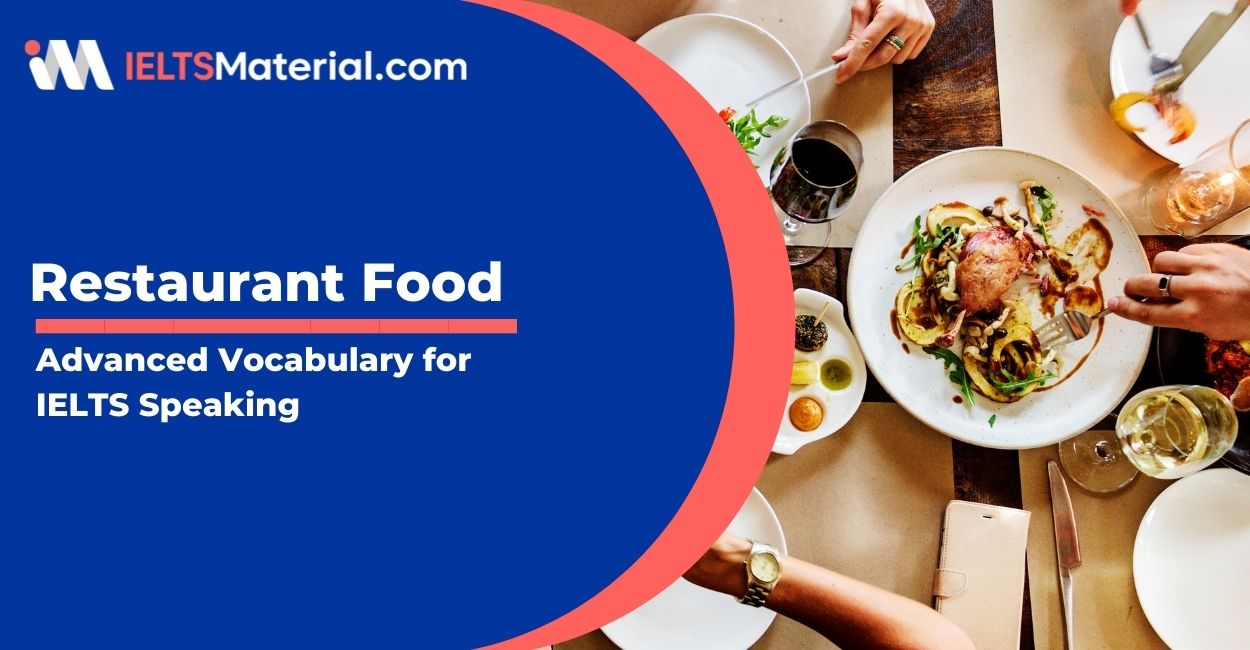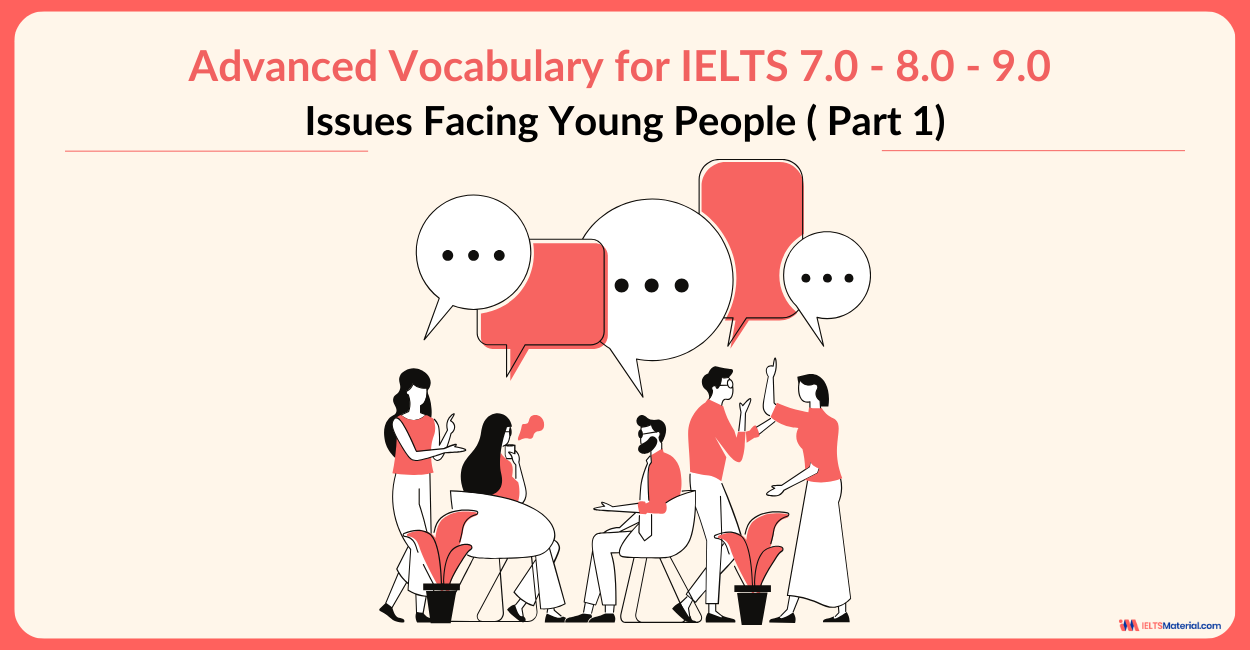Advanced Vocabulary for IELTS Speaking – Topic : Restaurant Food
Table of Contents

Limited-Time Offer : Access a FREE 10-Day IELTS Study Plan!
Introduction
Elevate your IELTS Speaking score with Advanced Vocabulary for IELTS Speaking – Topic: Restaurant Food. This guide provides essential vocabulary and phrases related to dining out, helping you articulate your thoughts more clearly and impress examiners with your language proficiency. Enhance your fluency and confidence when discussing restaurant experiences and food-related topics in the IELTS exam.
IELTS Speaking Topic: Food
This article covers useful collocations, idioms, adjectives to talk about food in IELTS speaking. Below mentioned are some of the idioms as well as the adjectives which describe food.
Idioms that Describe Food:
- To be full up.
Meaning: To eat to the point that you can no longer eat anymore or that you ate so much, you do not feel hungry.
E.g., Don’t order any more food, I have been full up already.
- To grab a bite.
Meaning: To gobble something (when you’re in a rush).
E.g., I was in a hurry this morning, so I grabbed a bite to eat and ran out for a meeting.
- The main meal.
Meaning: The meal at which you eat the most food is called the main meal.
E.g., Lunch is usually our main meal, except on Sundays.
- Stoke up with something.
Meaning: To eat a lot of a particular food or to fill oneself with food to avoid feeling hungry or weak later.
E.g., As she had an important meeting all day long, she stoked up with a lot of chicken soup and bread for breakfast.
[do_widget id=custom_html-47]
- To wine and dine.
Meaning: To entertain with food, eat sumptuously, or to treat someone with wine and dinner, it’s typically to impress him/her.
E.g., They wined and dined in one of the most luxurious restaurants in Paris after marriage.
- Shovel something into your mouth (= shovel down).
Meaning: To put large quantities of food into your mouth very quickly.
E.g., He was sitting in front of the TV shovelling a pizza into his mouth
- To be dying of hunger.
Meaning: An exaggerated way of saying you are hungry.
E.g., Let’s find something to eat. I am dying of hunger because of studying extensively for four hours.
- To be starving hungry.
Meaning: An exaggerated way of saying you are extremely hungry.
E.g., I’m starving hungry now. Let’s grab something to eat.
- To eat a balanced diet.
Meaning: To eat the correct types and amounts of food or to eat the kind of food which fulfils a person’s nutritional needs.
E.g., To lose weight, we should try to eat a balanced diet with less sugar intake.
- To eat like a horse.
Meaning: To eat a lot.
E.g., Eating like a horse in a party may be considered to be extremely impolite.
- To have a sweet tooth.
Meaning: To enjoy sugary food. To have a craving or strong fondness for sweet food.
E.g., I’m terrified of gaining weight quickly and contracting diabetes because I have a sweet tooth.
- Home-cooked food.
Meaning: Food cooked at home or food cooked using raw and fresh ingredients that are made personally.
E.g., Although home-cooked food is usually not as delicious as the one served in restaurants, it is much more beneficial to your health.
- To make your mouth water.
Meaning: To make you feel very hungry for something or the food that makes your mouth salivate.
E.g., McDonald’s serves all kinds of burgers, from cheeseburgers to beef burgers. They make my mouth water every time I walk into the restaurant.
- To foot the bill.
Meaning: To pay the bill for something typically when the amount is considered large or unreasonable.
E.g., My friend asked me out for dinner, and he didn’t want me to foot the bill.
- To spoil your appetite.
Meaning: To eat something that will stop you feeling hungry or makes you skip the next meal when it’s meal-time.
E.g., Don’t snack too much. It will spoil your appetite.
- Carry-out.
Meaning: Take-out, food that is cooked and sold by a restaurant or store to be eaten elsewhere.
E.g., They offer carry-out burgers in their restaurant.
- Processed food.
Meaning: Commercially prepared food bought for convenience. The food is cooked, canned, frozen, or packed in nutritional composition to preserve differently.
E.g., Processed food is very convenient for those who are busy all day long, but eating it frequently may be very harmful to our health.
18. To bolt something down.
Meaning: To gobble something that you hardly chew or taste it.
E.g., My son bolted down his lunch and went out with his friends.
19. To follow a recipe.
Meaning: To cook a meal using instructions.
E.g., I set up and run a popular blog that gives readers hundreds of quick lessons on how to follow recipes to make any dish great.
20. Drive through (drive-thru)
Meaning: Type of service provided by a business that allows customers to purchase products without leaving their cars.
E.g., On the way, he went into a fast-food drive-through and ordered food.
21. A quick snack
Meaning: To eat a small amount of food between meals. A simple meal that is easy to cook and eat.
E.g., I didn’t have time for lunch, so I just grabbed a quick snack.
22. Eat-in
Meaning: To have a meal at home rather than in a restaurant.
E.g., Neither of us felt like going out tonight, so we ate in.
23. Binge eating
Meaning: Eating a lot of food in a short period, especially without being able to control yourself.
E.g., He had a binge eating disorder.
24. A slap-up meal.
Meaning: A large meal or a lavish enjoyable meal.
E.g., They went to a slap-up meal on their wedding anniversary.
25. To tuck into.
Meaning: To eat something with pleasure or to eat food heartily.
E.g., She was tucking into a massive plate of pasta.
26. Go on a diet.
Meaning: Trying to lose weight by eating less food or specific foods and having a nutritional plan consisting of eating a smaller amount of food.
E.g., She thought she should go on a diet.
To maximize your IELTS Band score, consider Enrolling in our IELTS online classes and get expert guidance for your exam preparation.
Also check :
- IELTS Speaking tips
- IELTS Vocabulary books
- IELTS Listening Vocabulary
- Sports Vocabulary IELTS
- English Pronunciation in use Intermediate pdf
- Work Vocabulary IELTS
- Advanced Vocabulary for IELTS
Adjectives to Describe Food
An adjective is something that modifies a word to make it more specific. There is a vast repertoire of adjectives to describe a good taste.
Uncommon Adjectives with Examples:
| Delectable |
For a light and delectable dessert, try sticky rice and tropical fruits.
|
| Enticing |
Our menu ranges from enticing salads, char-grilled steaks, sizzling fajitas, succulent ribs and much more.
|
| Palatable |
The snapper is the most palatable of a good variety of sea fish.
|
| Scrumptious |
These are scrumptious puddings that no-one can resist.
|
| Tantalizing |
It is the tantalizing aroma of freshly baked bread.
|
| Sumptuous |
It was a sumptuous lunch.
|
| Divine |
This food is divine.
|
Common Adjectives with Examples:
| Amazing |
Wow, this pasta salad is amazing.
|
| Appealing |
Fast food is more appealing to the masses than healthy food.
|
| Enjoyable |
Here are some ways to make family mealtimes enjoyable.
|
| Excellent |
People gathered to enjoy an array of excellent food.
|
| Appetizing |
It is an appetizing dessert.
|
| Yummy |
This cheesecake is yummy. I’m going for another slice.
|
| Flavourful |
I love how flavourful this soup is with all the fresh herbs and vegetables in it.
|
Conclusion
Mastering advanced vocabulary related to restaurant food can significantly enhance your IELTS Speaking performance. By incorporating the essential words and phrases from Advanced Vocabulary for IELTS Speaking – Topic: Restaurant Food, you’ll be able to discuss dining experiences with greater fluency and confidence. This targeted IELTS Vocabulary practice will help you articulate your thoughts more clearly and impress the examiners, ultimately boosting your overall IELTS band score.

Start Preparing for IELTS: Get Your 10-Day Study Plan Today!
Improve your Vocabulary from our Vocabulary Articles

Janice Thompson

Courtney Miller

Courtney Miller









Post your Comments